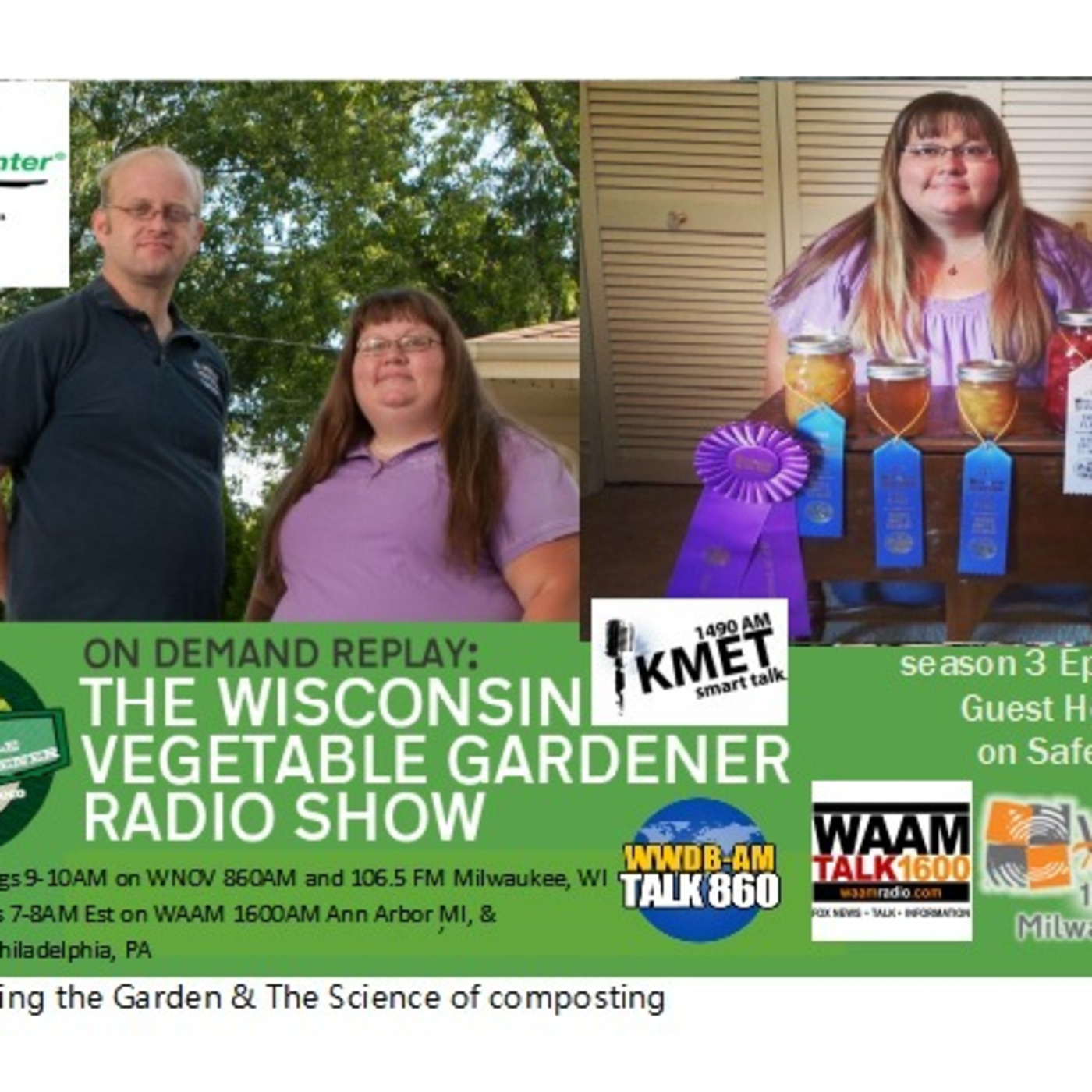S3E21 Weeding, the science of composting, Safe canning with Holly Baird - The Wisconsin Vegetable Gardener radio show
- Author
- The Gardening with Joey & Holly radio show (The Wisconsin vegetable gardener)
- Published
- Mon 22 Jul 2019
- Episode Link
- https://www.podomatic.com/podcasts/thewisconsinvegetablegardenerpodcast/episodes/2019-07-22T04_00_00-07_00
Replay of The Wisconsin Vegetable Gardener Radio Show from 7-6-19
Heard on 860AM WNOV & W293cx 106.5FM Milwaukee, WI Saturday mornings 9-10AM CST
Heard on WAAM 1600 AM Ann Arbor, MI Sundays 7-8AM est
Heard on WWDB 860 AM Philadelphia, PA Sundays 7-8AM est
Heard on KMET 1490 AM Tuesdays 9 - 10 AM pst Banning, CA
listen here during show hours for your station:
WNOV https://tinyurl.com/y8lwd922
WWDB: https://wwdbam.com/
WAAM https://tinyurl.com/p68cvft
KMET https://www.kmet1490am.com/
Check out https://thewisconsinvegetablegardener.com/
In segment 1 Joey and Holly talk about Weeding your garden how and the options that are out there.
Weeding the garden
Flame Engineering Inc. of www.flameengineering.com they have the most complete line of propane torches, heaters, agricultural flamers and leisure products to be found anywhere. Use coupon code WVG19 to get free shipping.
BioSafe of www.biosafe.net Garden line offers a diverse array of eco-friendly products to support all facets of plant life, products that do not leave a lasting footprint Save 10% on your next order use coupon code TWVG at checkout.
Pro Plugger of www.proplugger.com Dig planting holes from a comfortable standing position bulbs annuals groundcover lawn grass veggies 5-IN-1 digs the perfect depth hole for each job
Pull out full weed - use fork, remove all of the weed
Weeds will propagate themselves
Weed when they are small
Use mulch to help smother weeds
In segment 2 Joey and Holly talk about The science of the compost pile
three main stages in the composting cycle in which different types of microorganisms thrive.
The first stage is typically only a couple of days long during which mesophilic microorganisms, or microorganisms that thrive in temperatures of about 68 to 113 degrees Fahrenheit (20 to 45 degrees Celsius), begin physically breaking down the biodegradable compounds. Heat is a natural byproduct of this initial process and temperatures quickly rise to over 104 degrees F (40 degrees C).
Mesophilic microorganisms are replaced by thermophilic microorganisms (microorganisms that thrive in the increased temperatures) during the second stage, which can last from a few days to several months. The thermophilic microbes work to break down the organic materials into finer pieces. The higher temperatures are more conducive to breaking down proteins, fats and complex carbohydrates.
Also, during the second stage, temperatures continue to rise and if not closely watched, the compost pile can get so hot that it can eventually kill off all the helpful microorganisms. Techniques such as aeration and turning over the compost pile help keep temperatures below about 149 degrees F (65 degrees C), as well as provide additional oxygen and new sources for the thermophilic microorganisms to break down.
The third stage, which typically lasts for several months, begins when the thermophilic microorganisms use up the available supply of the compounds. At this stage, temperatures begin to drop enough for mesophilic microorganisms to resume control of the compost pile and finish breaking down the remaining organic matter into usable humus.
balance of "greens" and "browns" is needed to create the proper environment for composting to occur. Greens are nitrogen-rich, and include items such as grass clippings, fruit and vegetable waste, and coffee grounds. Browns are the carbon-rich yard clippings, such as dead leaves, branches and twigs.
A carbon-to-nitrogen ratio between 25 to 1 and 30 to 1 is ideal for rapid composting
There are two main classes of composting microorganisms, known as aerobes and anaerobes, according to Planet Natural.
The aerobes are bacteria that require oxygen levels of at least 5 percent to survive and are the most important and efficient composting microorganisms, according to the University of Illinois. The aerobes consume the organic waste and excrete chemicals such as nitro(continued)
